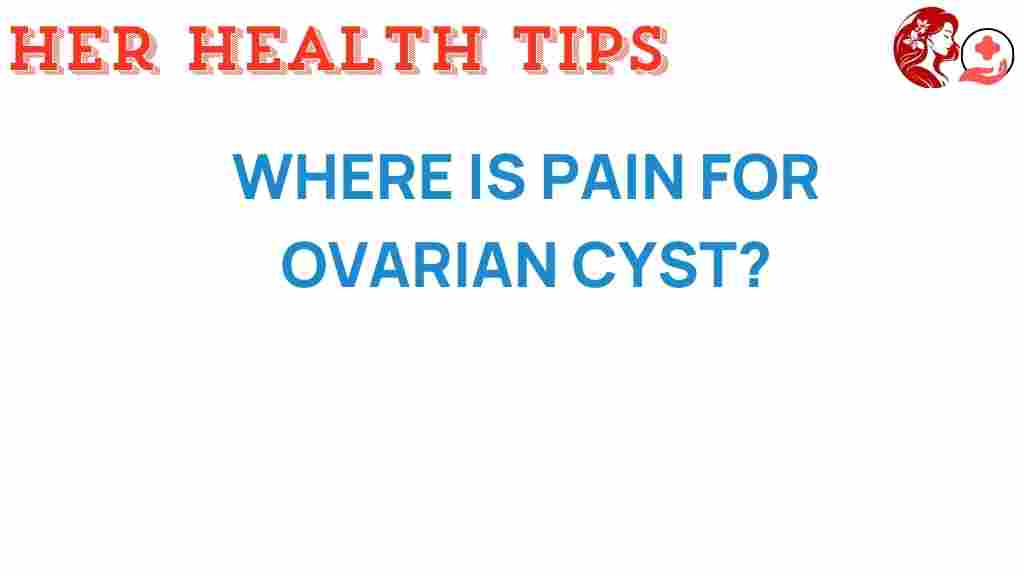Unearthing the Mystery: Where Does Pain from Ovarian Cysts Manifest?
Ovarian cysts are fluid-filled sacs that develop on the ovaries and are quite common among women of reproductive age. While many women may experience no symptoms, others may suffer from significant pain and discomfort. Understanding where this pain manifests, its symptoms, and the overall impact on women’s health is crucial for effective diagnosis and treatment. In this article, we will explore the various pain locations associated with ovarian cysts, delve into their symptoms, and provide insights into diagnosis, treatment options, and cyst management.
Understanding Ovarian Cysts and Pain Locations
Ovarian cysts can cause a range of symptoms, often related to their size, type, and whether they rupture. The pain associated with ovarian cysts can be localized in several areas of the body. Here’s a breakdown of common pain locations:
1. Pelvic Pain
Pelvic pain is one of the most common symptoms associated with ovarian cysts. This pain can manifest in several ways:
- Dull ache or pressure: This is often felt in the lower abdomen or pelvic area.
- Sharp pain: This can occur, especially if the cyst ruptures or if there is twisting of the ovary (ovarian torsion).
- Chronic pelvic pain: Some women experience ongoing discomfort that may fluctuate in intensity.
2. Lower Back Pain
In addition to pelvic pain, some women report experiencing lower back pain due to the pressure from the cysts on surrounding structures. The connection between the pelvis and lower back makes it common for pain to radiate to this area.
3. Abdominal Pain
Abdominal pain can occur as well, especially if the cyst is large. Women may feel a sense of fullness or heaviness in their abdomen, which can be uncomfortable and concerning.
4. Pain During Intercourse
Some women with ovarian cysts may experience pain during sexual intercourse. This symptom can be attributed to the pressure of the cysts or irritation of surrounding tissues during penetration.
5. Pain During Menstruation
Ovarian cysts can exacerbate menstrual cramps, leading to increased pain during periods. Women may notice a change in the intensity of their menstrual discomfort.
Recognizing the Symptoms of Ovarian Cysts
Beyond pain, ovarian cysts can present a range of symptoms that may affect women’s health. Common symptoms include:
- Irregular menstrual cycles: Changes in the regularity or flow of periods can be a sign of ovarian cysts.
- Bloating: A feeling of fullness or swelling in the abdomen can accompany the presence of cysts.
- Nausea or vomiting: Particularly if a cyst ruptures, these symptoms may arise.
- Frequent urination: Pressure from the cysts can affect bladder function.
- Fatigue: Chronic pain and discomfort can lead to feelings of fatigue or low energy.
The Importance of Diagnosis
Diagnosing ovarian cysts is essential for effective treatment and management. If you experience symptoms associated with ovarian cysts, it’s important to consult a healthcare provider. The diagnosis process typically involves:
- Medical history: Discussing your symptoms and menstrual cycle with your doctor.
- Physical examination: A pelvic exam can help identify abnormalities.
- Ultrasound: This imaging test is commonly used to visualize the cysts and assess their size and type.
- Blood tests: These can be performed to check hormone levels and rule out other conditions.
For more detailed information on women’s reproductive health, you can visit womenshealth.gov.
Treatment Options for Ovarian Cysts
The treatment for ovarian cysts largely depends on their type, size, and symptoms. Here are common treatment options:
1. Observation
If the cyst is small and not causing significant symptoms, your doctor may recommend a watchful waiting approach. Regular ultrasounds may be used to monitor the cyst’s status.
2. Medications
Hormonal contraceptives, such as birth control pills, can help regulate your menstrual cycle and prevent the formation of new cysts. Pain relievers may also be prescribed to manage discomfort.
3. Surgery
In cases where the cyst is large, persistent, or causing severe pain, surgery may be necessary. Surgical options include:
- Laparoscopy: A minimally invasive procedure to remove the cyst.
- Laparotomy: A more invasive surgery for larger cysts or if there is concern for cancer.
Cyst Management and Lifestyle Adjustments
Managing ovarian cysts also involves lifestyle changes that contribute to overall reproductive health. Here are some tips:
- Maintain a healthy diet: A balanced diet rich in fruits, vegetables, and whole grains can support hormonal balance.
- Stay hydrated: Drinking plenty of water can help alleviate symptoms of bloating and discomfort.
- Regular exercise: Physical activity can help reduce stress and improve overall health.
- Monitor menstrual cycles: Keeping track of your cycle can help identify any changes or irregularities.
Troubleshooting Tips for Managing Pain from Ovarian Cysts
If you are experiencing pain from ovarian cysts, here are some troubleshooting tips that may help:
- Heat therapy: Applying a heating pad to the pelvic area may help relieve cramps and discomfort.
- Over-the-counter pain relief: Nonsteroidal anti-inflammatory drugs (NSAIDs) can help manage pain and inflammation.
- Relaxation techniques: Practices such as yoga, meditation, and deep breathing can help reduce stress and manage pain.
- Consult your doctor: If pain intensifies or new symptoms arise, seek medical attention promptly.
Conclusion
Understanding where pain from ovarian cysts manifests is key to addressing the symptoms and improving women’s health. By recognizing the locations of pain, associated symptoms, and the importance of diagnosis, women can take proactive steps in managing their reproductive health. Treatment options vary based on individual circumstances, but with the right approach, many women can find relief from the discomfort caused by ovarian cysts. If you suspect you have ovarian cysts or are experiencing related symptoms, consult a healthcare professional for guidance.
By staying informed and engaged with your health, you can take charge of your reproductive health and ensure that any issues with ovarian cysts are managed effectively.
This article is in the category Reproductive and created by HerHealthTips Team
